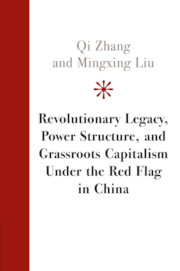Crossref Citations
This Book has been
cited by the following publications. This list is generated based on data provided by Crossref.
2019.
Books received.
The China Quarterly,
Vol. 239,
Issue. ,
p.
845.
Zhang, Changdong
2020.
Reexamine regional models of China's economic growth: Toward an integrated analytical framework.
Sociology Compass,
Vol. 14,
Issue. 5,
Gerth, Karl
2020.
Unending Capitalism.
Li, Daniel Z.
Li, Zeren
and
Zhang, Qi
2021.
Downward Power Consolidation and Public Investment: Theory and Evidence from China.
SSRN Electronic Journal ,
Li, Daniel Zhiyun
Li, Zeren
and
Zhang, Qi
2022.
Downward Power Consolidation and Public Investment: Theory and Evidence from China.
SSRN Electronic Journal ,
Hou, Yue
and
Li, Siyao
2023.
Stimulated political decisions: local leadership turnover and firm subsidies in China.
Political Science Research and Methods,
Vol. 11,
Issue. 1,
p.
18.
Pearson, Margaret M.
Rithmire, Meg
and
Tsai, Kellee
2023.
The State and Capitalism in China.
Schakenbach Regele, Lindsay
2024.
A Brief History of the History of Capitalism, and a New American Variety.
Enterprise & Society,
Vol. 25,
Issue. 1,
p.
2.
Chen, Chao
and
Jiang, Qinzhi
2024.
Local State Autonomy and Economic Transformation: A Comparative Study of Two Chinese Cities.
Journal of Contemporary Asia,
p.
1.
Luo, Kevin Wei
2024.
Between Scylla and Charybdis: Land Reform and Local Agents Under the Chinese Communist Regime.
Studies in Comparative International Development,
Vol. 59,
Issue. 3,
p.
464.
Lan, Xiaohuan
2024.
How China Works.
p.
293.
Su, Fubing
and
Tao, Ran
2024.
Meritocracy or Patronage?.



